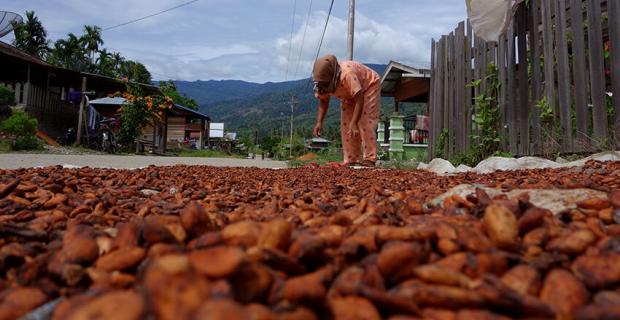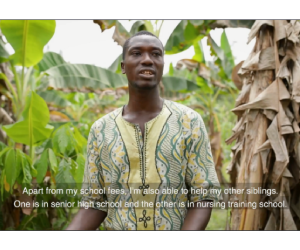Prep-eez: Improving Incomes and Building Resilience among Cocoa Farmers in Ghana.

In a project supported by the Mastercard Foundation Fund for Rural Prosperity, Prep-eez, a Ghanaian-owned company, is directly addressing the unique challenges faced by smallholder cocoa farmers and changing the narrative.
While cocoa contributes nearly 20% to Ghana’s GDP, this does not necessarily translate directly into high incomes and a high quality of life for many cocoa farmers in the country.
The life of a smallholder cocoa farmer is not easy. Yields have been in decline, in part due to poor crop practices. A new cocoa farmer might toil for two or three years before being able to earn an income from matured cocoa plants. During that time, the farmer must deal with all manner of seasonal factors, and pests and diseases on the farm, as well as do labour-intensive work such as pruning.
Although seedlings are distributed free by government agencies to maintain quality, there are never enough to go around. High-yielding seed from private sector seed companies, and inputs such as fertilizers, are expensive for farmers to purchase. When farmers are finally ready to sell their beans, there are often transport challenges such as poor road infrastructure between farms and the buyers. Farmers then have to hope that fluctuating global cocoa pricing does not erode potential income and investments made on the crop to that point. Sometimes there are quality disputes causing payment delays with buyers.
Whatever is earned often ends up being used for family essentials such as food, school fees, transport, clothing, and medical expenses. These needs compete directly with the short and long-term demands of the cocoa farms themselves – necessary farm inputs for example, and labour costs.
As a result of all these challenges, smallholder farmers find it difficult to have enough to invest in their farms, in farming skills, labour, or new crops. Their long term security is threatened and they live with the worry that they may not be able to provide enough for themselves or their families.
Ghana’s Prep-eez is changing this narrative.
The company is not only supporting Ghanaian smallholder cocoa farmers to improve their incomes from cocoa. It is also managing a programme to improve their income substitution from secondary crops like plantain. Additionally, using its background in smart technology, the company is profiling farmers and their farms, making access to financial services such as insurance and savings easier for them as they build up their credit profiles.
A key component of Prep-eez support is the provision of credit, without which farmers find it very difficult, and sometimes nearly impossible, to invest in their cocoa farms. For example, the company has introduced an automated labour credit system which enables farmers to prune trees more easily, safely, and frequently.

“Before Prep-eez came to help the community, we would prune the trees ourselves, using ladders and cutlasses - sometimes falling and hurting ourselves.”

“Now they come to prune them for us, which is increasing our yields, and they allow us to pay on credit after we harvest our cocoa.” - Kwesi Ewesi, farmer
Another initiative from Prep-eez is their alternative livelihood programme. It helps farmers earn additional income from secondary crops they would otherwise not have planted. Here, Prep-eez provides a credit for seedlings and planting materials such as plantain, from which the farmer earns income while cocoa trees mature. Importantly, the insurance of their farms can be billed to the secondary crop earnings, providing additional resilience in times of need.

“If it were not for Prep-eez helping me add plantain to my cocoa crop, I am sure by now I would have dropped out of school to stay at home.” - Maxwell Amoako, student
Sam Kow, Chief Executive Officer of Prep-eez, says that with the various interventions from the company small holder cocoa farmers are now able to save some money through all their practices. They are also able to fast track farm management practices and make extra money to take care of their families, placing them in a much better place than before. The company hopes that, through its work, farmers will develop a credit profile which will make it easier for them to access other financial products and services from banks or microfinance institutions for even greater benefit.
Mastercard Foundation Fund for Rural Prosperity support to the Prep-eez project is used in various ways: to reach out to the farmers, in training and capacity-building of key operating staff in the community, to register and profile farmers, and to support income improvement and resilience services.
The FRP-supported project is now two-and-a-half years old. Prep-eez estimates almost 12,000 smallholder farmers are already benefiting by receiving farm labour credits and professional advice, as well as by receiving supplies of cocoa seedlings, plantain suckers, or alligator peppers.
Prep-eez estimates about 30% of the subscribers to its programme are women. There are also many indirect jobs being created in the communities and regions. In addition, it is estimated that some 100,000 people are receiving financial literacy support as well through this initiative.
(Figures reported by Prep-eez as of December 2017. Impact figures are verified during Fund Monitoring and Evaluation visits)
---------------------------------------------
Watch this video to get the unique perspectives of farmers and students benefiting from Prep-eez work. You will hear from Sam Kow, CEO, about this innovative project and how Fund support is making a difference.
Article by Colin Azavedo, Communications, Mastercard Foundation Fund for Rural Prosperity.
Add new comment